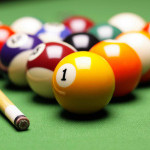Category: Entertainment
Created by: a.protic
Number of Blossarys: 5
Follow shot is a shot in which the cue ball is struck above its equator, in order to cause the cue ball to travel forward after it contacts an object ball.
A shot in which the cue ball travels backwards after striking an object ball. It is performed by striking the cue ball below its equator in order to make it spinning backwards.
Diamonds are the markings usually inlaid into the surface above the rail cushions, used as target or reference points. Normally, there are three equally spaced diamonds between each pocket on a pool ...
A massé shot involves a steep curve or complete reversal of cue ball direction without hitting any rails or other balls. It is done by striking the ball with a cue stick from a steep angle, and thus ...
Cushions are the elastic bumpers mounted on the inside of a billiard table frame - the part from which the balls rebound. Cushions are normally made from rubber or synthetic rubber.
Billiard chalk is a powdered substance placed on the tip of a cue stick to increase the friction between the tip of the cue and the cue ball. Cue "chalk" is not actually chalk (calcium carbonate) at ...
The 8 ball is the last ball that must be pocketed, after pocketing the group (either solids or stripes) of seven object balls. Pocketing the 8 ball early is a loss of game. It is usually black in ...


 English (EN)
English (EN)




